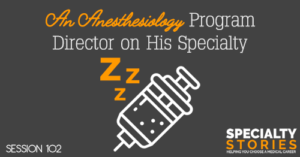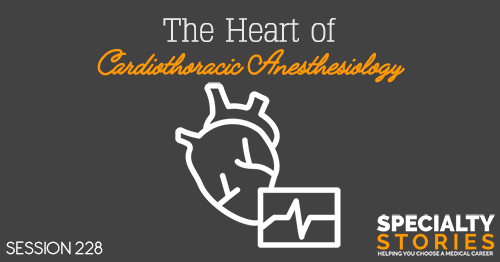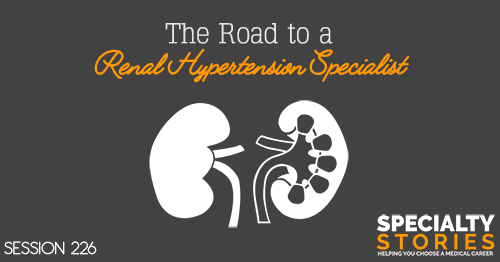Apple Podcasts | Google Podcasts

Session 102
Dr. Ryan Matika Residency Program Director in Anesthesiology talks about what he’s looking for in his applicants. He also shares what his residents look for when students are doing rotations.
Specialty Stories is part of the Meded Media. If you haven’t yet, please check out all the other resources we provide to help premeds, medical students, and residents on their medical journey!
Listen to this podcast episode with the player above, or keep reading for the highlights and takeaway points.
[01:07] Interest in Anesthesiology
Ryan got interested in anesthesiology when he was in his second year in medical school. They had a program where they were assigned a mentor who happened to be an anesthesiologist.
He went into medical school not thinking about anesthesiology. In fact, he was leaning into internal medicine. But from his rotations, he eventually got drawn towards anesthesiology. He thought about this halfway through his third year because of his mentor.
Ryan thinks there is a major element in picking your specialty based on the personality and that element of finding your people. There’s a certain type of personality that’s a better fit for a specialty than others. But that said, he doesn’t think any specialty has one personality.
'I think there's a major element of picking your specialty based on the personality and that element of finding your people.'Click To Tweet[03:10] Traits that Lead to Being a Good Anesthesiologist
The longer he has done this, the more he thinks that there are more traits to being a good doctor. Those traits pretty much transcend the type of residency. He thinks all residents of different specialties have a lot of things in common.
First is what drives you, what keeps you up in the morning. That type of work ethic and that type of positive drive would make good residents.
For anesthesiology in general, they’re meticulous. Although being OCD is not necessary, but you might notice a lot of OCD behaviors evident in anesthesiologists.
[05:10] What an Anesthesiologist Does
They say that the only thing an anesthesiologist does is putting patients to sleep and waking them up after surgery is one of the misconceptions. There are times your services are requested by a surgeon and part of that is keeping patients calm.
But one of the most important things is delivering the anesthetic methods essentially rendering someone in a medically induced coma to tolerate surgery. Also during that time, you’re managing the patient’s physiology, most importantly the cardio and pulmonary physiology.
They could give medications to make patients very hypotensive. The patients can be put through all kinds of cardiovascular difficulties and you have to manage them through.
The anesthetics would give necessary poisons and the management they do is to offset those poisons in a healthy patient. And this could get even more tricky for patients with chronic, significant or uncompensated diseases.
'The anesthetics we give are necessary poisons and the management that we do is try to offset those poisons in a healthy patient and in unhealthy patients, it's even more tricky.'Click To TweetA lot of the time is focused on physiology and the vitals. While a little bit less time is spent on ensuring that patients are in a medically induced coma as they have to ensure patients are asleep throughout the surgery.
[Related episode: What is Anesthesiologist? A Community Doc Shares His Story]
[07:40] The Residency Training Path
There are two types of programs – the categorical and the advanced programs. Almost everything was advanced in the good old days. Then categorical has gotten more popular. the difference is how you treat that first or intern year.
About 75% of the spots are categorical. When you match with an anesthesiology program, you’re doing a four-year program. But the first year is essentially mostly off-service rotations. Its purpose is to meet the qualifications of your intern year which is either a medicine year or a surgery year.
The advanced year is where you match those two years into separate ones. So you have the intern year where you match into a medicine transitional or surgical year. Then you start your formal anesthesiology three-year training afterward.
During those three years, you do the same cases over and over again. You do more simplicity, a lot of airway work. You’re getting the basic skills you need for anesthesiology.
During the latter half of your residency, you’re doing subspecialties. You deal with much sicker patients such as cardiac cases. Each program has a different way of doing that but essentially, there are more similarities than there are differences.
After four years and you’ve met all of your requirements, you can then sit for your final written boards.
[Related episode: The Role of Residency Training For Physicians]
[09:50] Manual DExterity for Procedures: Is This Necessary?
The most important thing you have to have is your mind. The cerebral side of it is the hard part. In terms of the procedural part, anybody with two hands can be trained to do the procedures as you will be doing it over and over again.
In fact, Ryan has never seen a resident that has not completed training because of a procedural aspect. 90% of the problem with residents would be medical knowledge or professionalism. And 0% with procedures. There are some people who are better sooner than others but everybody will get there.
'The cerebral side of it is the hard part... there are people that are more talented with hands. But you'd do the same thing over and over again, you'll get it.'Click To Tweet[11:05] What They Look For in Applicants
Generally speaking, one thing that has changed about applicants is the basic exam, which is part of the American Board of Anesthesiology done at the end of your PGY. You need to pass this exam to be able to complete your residency.
'Nobody wants to hire a resident and have to fire them because they can't pass an exam.' Click To TweetSo they always look at your USMLE scores. They essentially tell you how good you are in studying and passing an exam. Many programs have a certain average score they’re looking at. If you have a lower score than that, then you may have to make up for it with different qualities.
Ryan personally looks a lot at the Dean’s letter, your medical school transcripts, the comments made, grades on your clerkships (particularly medicine and surgery).
'A strong rotation clinically and doing well can offset that one single exam and that's very important.'Click To TweetMost people have positive letters of recommendation. There are various levels of strength on that. So this may be a little bit less important than the other two mentioned above.
Another thing that gets underestimated is the volunteering aspect. They want to see students getting more involved with different activities at their medical school or at their local communities.
They basically want to see what you were doing during your medical school time beyond just studying and getting the best grades possible.
Research is not necessary. But Ryan takes this into account in looking at grades and scores but it doesn’t necessarily overcome a bad grade.
[16:10] On Pass/Fail System
Ryan admits that the ability to evaluate students based on the pass/fail system can be more challenging. A large percentage of medical schools has already gone to not give a class rank. The opposite effect is what they were going for. There’s only one score to tell you about their academic abilities.
Making USMLE’s into a pass/fail is fine. But now they’re going to have to put more emphasis on different factors. They want more information. The board exam process is very difficult. It’s not something to be taken lightly.
'As a program director, we want more information, not less.'Click To Tweet[18:49] On Away Rotations
Ryan has done round table events at their schools and he’s one of the few people who think that away rotations aren’t much help. He personally thinks that away rotation only helps you at the program you’re interviewing at. It doesn’t really help much when you’re going out on your interviews.
If there’s a program you’re really interested in or if you have a place to stay with then that’s totally fine. But with the medical school debt and the financial concerns in medicine, the cost of it to go somewhere and rotate wouldn’t pay the dividends unless you’re really set on one location.
[21:55] On Osteopathic Medical Students
The osteopathic medical students have been increasingly been more successful in getting anesthesiology spots over the last 10-15 years. You’re now seeing DOs in spots that you won’t previously see.
'There is an element that when you go to an osteopathic medical school, it is more difficult in general to get a residency spot than an allopathic spot. But it's not much harder.'Click To TweetRyan says that the DOs at their programs typically have a little bit higher board scores than the allopathic residents in general. But it’s only a minor difference.
[Related episode: Let’s Talk About Osteopathic Docs and What You Need to Know]
[23:35] What Makes a Good Anesthesiologist
Ryan explains that they look for qualities like work ethic, personality, and professionalism.
A lot of anesthesiologists are introverts. So you don’t have to make small talk or be the most likable person in the world. You must be willing to help, want to know more, and ask questions.
'Being a lifelong learner is extremely important for any specialty nowadays.'Click To TweetAnother important thing is for residents to be able to follow directions. But procedural skills are often emphasized by applicants than they are by their faculty. Hence, you really don’t have to worry about the procedural aspect.
If you really don’t enjoy the procedures and dread doing it hen it’s a nice thing to know that this is not a great fit for you. You should enjoy it but you don’t necessarily have to be good at it.
[28:00] Personal Statement Tips
After reading so many personal statements, you start to see certain trends in personal statements. The most important thing outside of the why and “tell me about yourself” is explaining any kind of deficiency in your application. Ryan needs you to explain what went on in a greater context. This needs to be explained and acknowledged in the personal statement.
'Your personal statement is really a nice place to showcase your personality and what makes you tick.'Click To TweetRyan isn’t sure if a great personal statement makes up for any trouble on the application. But a bad personal statement could raise a few eyebrows and lose you a few interviews. Bad personal statements are going to be things that are too negative.
[Related episode: The Medical School Application Personal Statement]
[30:45] A Typical Day in the Resident’s Life
When you’re on your medical student rotation in anesthesiology, you’re already getting a piece of it. The classic anesthesia medical student rotation is you come in early and leave early.
The residency is not going to be like this. You’ve got to come in early and you’ve got to stay late. This means long hours.
As an attending physician, you come in early in the morning. As a resident, give yourself around 20-30 minutes to set up for your case. This means getting your medications, monitors, and equipment ready. If you have morning didactics, you’d have to come in earlier.
Then you’d have to go see your first patient in the morning. You can look up the patient the day before so you can have a plan.
The next morning, you see the patient and ensure they’re ready for surgery. You get their IV in (depending on the institution). When it’s time to go back, you’re going to take that first patient back. If it’s a cardiac case, it’s going to take longer since there is more pre-evaluation.
Throughout the day, you’re going to be doing a variety of cases if you’re in the operating room. It’s a lot of work to stay vigilant. It’s a lot of work to get different cases going.
'Each patient needs an individualized anesthetic plan.'Click To TweetJust like you’re taking off and landing, you’re going to be doing that for each patient. You really need to individualize things. If you’re at a tertiary care center, you’re going to have some very complex patients. Each patient needs a careful evaluation.
As for the resident level, this needs to be done the night before so they have time to prepare, research, and plan out. The simplest part of it is how to keep them asleep. But the most difficult part of it is how to keep them safe throughout the surgery.
[Related episode: Resident Duty Hours and the Ripple Effect]
[34:20] Taking Calls
Calls vary greatly between residencies. They can be specific to a rotation or they can just be a general pool for different services.
At their program, different rotations have different calls. When you’re doing the general emergency cases, usually residents do one to two nights a week and one to two weekend nights a week.
[35:40] Final Words of Wisdom
There are a lot of spots for anesthesiology. There are about 1400-1500 spots in the country per year. So your chances aren’t bad even if you have some issues with your grades.
In general, applicants with lower board scores have to really focus on their clinical rotations. Make this your priority.
Also, take a month off after your third year is over. Really dedicate yourself to the Step 2 exam. A much higher Step 2 and a low Step 1 is fine with them. But it can be concerning to have two low Step scores.
Ultimately, they need residents that they know are going to pass the boards. If possible, try to get some face time with a program director or someone involved in the selection process.
Links:
SEARCH SITE
LISTEN FOR FREE











